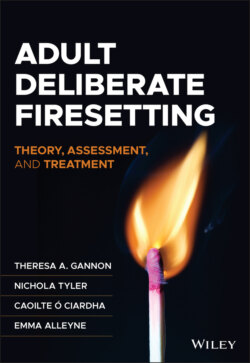Читать книгу Adult Deliberate Firesetting - Theresa A. Gannon - Страница 16
Book Rationale
ОглавлениеThis chapter has provided some of the context surrounding the emergence, in the past decade and a half, of research on deliberate adult firesetting as a coherent field of enquiry. Given the relative nascence of this field, some may ask whether an entire book devoted to the assessment and treatment of adults who set fires is necessary.
At times, firesetting has been viewed as one behaviour amongst a broad repertoire of offending, whereby the individual is generally antisocial (i.e., the generalist hypothesis; Gannon et al., 2013). There is some research evidence to suggest that people who set fires are likely to also commit other types of offences (e.g., Soothill et al., 2004), and they are more likely to recidivate in ways other than firesetting (see Chapter 4). Based on these findings, it could be argued that firesetting does not warrant special attention. However, there is a growing body of evidence that support the specialist hypothesis—that some people who set fires do not commit other forms of offending—or that people with firesetting convictions may represent a distinct population within correctional settings (Gannon et al., 2013). In other words, it appears that many individuals with a history of adult firesetting have distinct psychological and psychopathological features (see Chapter 2) that require a more tailored approach to treatment. Such targeting of these likely criminogenic needs is fundamental to the effectiveness of forensic clinical practice (see Bonta & Andrews, 2017).
The fact that emerging literature suggests that people who set fires represent a population within the criminal justice and healthcare systems that experience specific needs demonstrates how our understanding of deliberate adult firesetting has changed in a short period of time. We argue that this book is timely because it allows us to synthesise the findings of a rapidly expanding field while highlighting where the gaps remain in our knowledge and where new ways of working are needed in terms of the data that public agencies and researchers gather; the manner in which researchers approach hypothesis testing around the aetiology, assessment, and treatment of people who set fires; and the ways in which practitioners work with this population.
